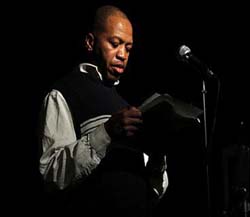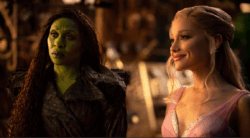On Sunday night at the K Street Busboys and Poets restaurant, Chris Shaw, an eloquent, friendly-looking, middle-aged man, recalled one of the strangest compliments he had ever heard. “He said to me, ‘You’re a homeless bum talking like Shakespeare, man.’”
In a sense, this praise that Shaw, a George Washington University grad school alumnus, received during his years as a homeless man in D.C. could summarize the entire open mic night. It was the first monthly installment of the 2011 Voices of a Movement series, which D.C.-based nonprofit One Common Unity is staging to spread awareness about pressing social problems. Each event, held on the third Sunday of every month, spotlights a different issue. Sunday’s event, which featured spoken-word, focused on Poverty and Homelessness.
“[The series] came from a need to address all of these various social issues that people aren’t really talking about in a way that uses art,” said Rajeev “HAWAH” Kasat, the executive director of One Common Unity and Sunday evening’s Emcee. “We want people who are well-versed in the issues to come and share, poetically, musically, and also through their experiences of storytelling.”
Sunday’s speakers certainly were well-versed in the poverty issue. Among those who performed were multiple writers for Street Sense, a D.C. newspaper sold and largely written by the District’s homeless. Although he didn’t recite any poetry, homeless man turned congressional assistant and activist Joel Segal spoke powerfully about how widespread and pertinent the poverty problem in America is.

“The new normal in America is to have homelessness forever,” he declared to an attentive audience.
But as attentive and involved as Sunday’s crowd was, the 40-something person turnout was modest compared to the three events that Voices of a Movement held last year at the same location. Those events, staggered seasonally and focusing on 2010-specific issues like health care and “the disaster of oil,” met with so much success that for the series’ sophomore year, One Common Unity decided that the events should be monthly.
“We probably had at least 120 people at each event,” Kasat said. “We actually had to turn people away at the door.”
Last year’s events also included more variety in art form, with a full, live band performing at each show, and each night’s lineup stacked with activists and performers. This year, the series is embracing the “open mic” idea, allowing those in the audience to take the stage among special guests. This turned out to be a good move—on Sunday, the first performer pulled from the audience was a woman whose poem chronicled the poverty-stricken lives of herself and her family members. She proved one of the night’s most compelling speakers.
“We need to celebrate diverse voices,” Kasat said. “The open-mic [setup is] a lot more community-oriented.”
To boost community involvement and bring in more unsolicited speakers, Voices of a Movement is looking towards taking publicity to a newer, higher-tech level. According to Kasat, One Common Unity is making efforts to get a live feed of the events streaming via their website, OneCommonUnity.org.
With the power of the year’s first event, combined with increased publicity and community outreach, the 2011 Voices of a Movement series seems likely to only gain momentum. Next month’s event on Feb. 20—which will focus on the prison-industrial complex—will likely garner a larger audience and more speakers from outside organizations, but still maintain One Common Unity’s focus on art as a vehicle for change.
“[We aim] to further the dialogue, and continue to have deep, artistic perspectives,” Kasat said. “It’s [bringing] together art and music to form a really entertaining, educational platform.”




